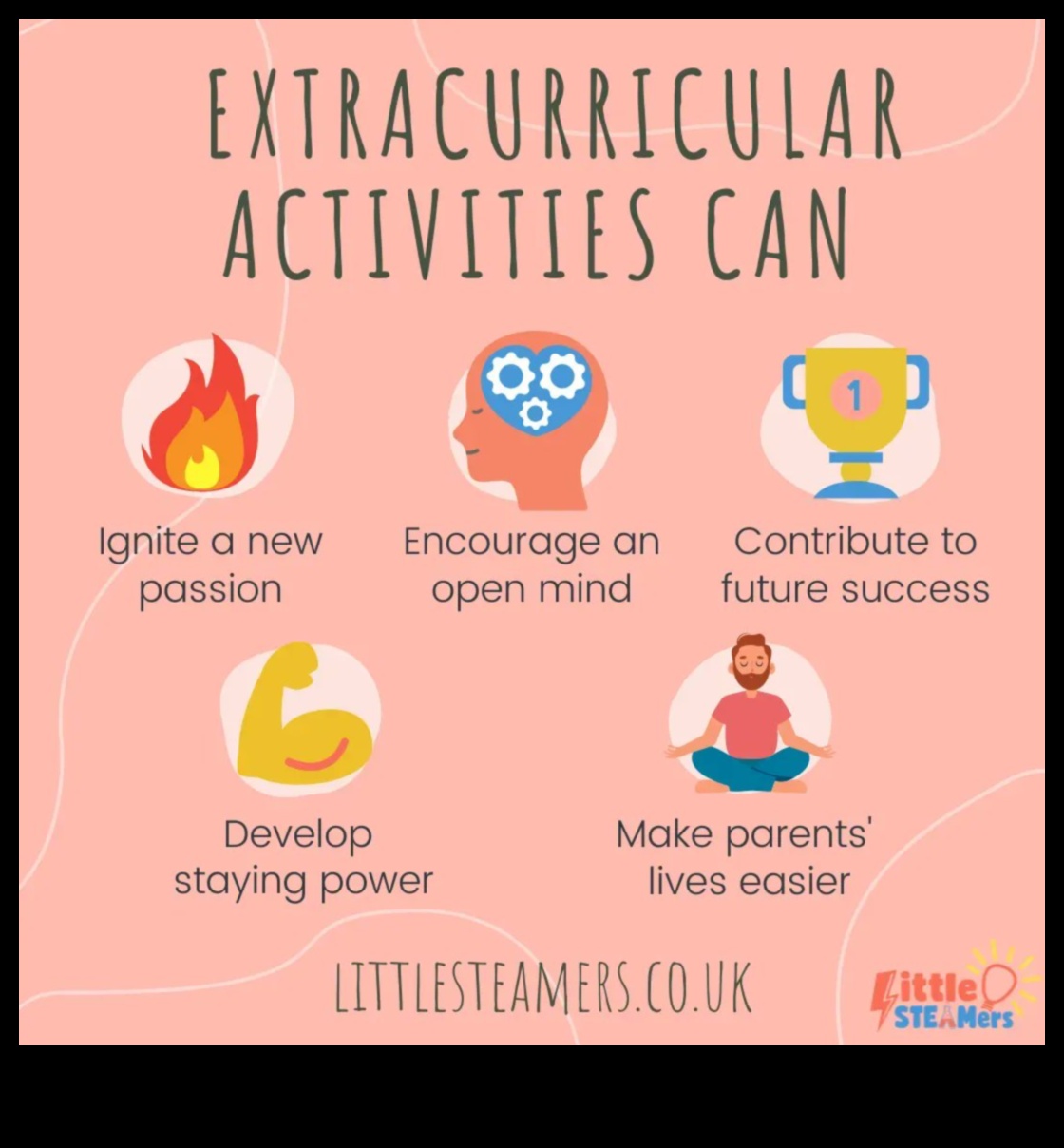
Beyond the Lecture Hall: University Extracurriculars Explored
Extracurricular activities are an important part of the college experience. They provide students with opportunities to learn new skills, meet new people, and make a difference in their community.
This guide will explore the benefits of extracurricular activities, how to choose extracurricular activities, how to get involved in extracurricular activities, and how to manage your time and stay motivated.
Benefits of Extracurricular Activities
Extracurricular activities can provide students with a variety of benefits, including:
- Social skills
- Leadership skills
- Communication skills
- Problem-solving skills
- Time management skills
- Resilience
- Work ethic
- A sense of accomplishment
These skills are essential for success in college and beyond. They can help you to get a job, get into graduate school, and achieve your personal goals.
How to Choose Extracurricular Activities
When choosing extracurricular activities, it is important to consider your interests, skills, and time constraints.
Here are a few things to keep in mind when choosing extracurricular activities:
- What are you interested in?
- What are your skills?
- How much time do you have?
- What are your goals?
Once you have considered these factors, you can start to narrow down your choices. There are many different types of extracurricular activities to choose from, so you are sure to find something that interests you.
How to Get Involved in Extracurricular Activities
Getting involved in extracurricular activities can be a great way to meet new people, make friends, and learn new things.
Here are a few tips for getting involved in extracurricular activities:
- Talk to your advisor or counselor.
- Check out the student activities fair.
- Look for flyers and posters around campus.
- Search online for extracurricular activities at your school.
Once you have found a few extracurricular activities that you are interested in, you can reach out to the organization or club to learn more about how to get involved.
Time Management for Extracurricular Activities
It can be difficult to balance academics, extracurricular activities, and your personal life. However, it is important to find a way to manage your time effectively so that you can do all of the things that you want to do.
Here are a few tips for managing your time for extracurricular activities:
- Create a schedule and stick to it.
- Prioritize your activities.
- Delegate tasks.
- Learn to say no.
By following these tips, you can manage your time effectively and make sure that you have time for all of the things that are important to you.
Balancing Academics and Extracurricular Activities
It is important to be able to balance academics and extracurricular activities. Both are important for your college experience and your future career.
Here are a few tips for balancing academics and extracurricular activities:
- Set realistic goals for yourself.
- Manage your time wisely.
- Prioritize your activities.
- Ask for help when you need it.
- Enhancing academic performance
- Developing new skills
- Building leadership skills
- Expanding social networks
- Gaining valuable work experience
- Exploring new interests
- Giving back to the community
- Talk to your advisor or academic counselor. They can often provide you with information about extracurricular activities that are a good fit for your interests and academic goals.
- Check out your university’s student activities website. This website will typically have a list of all of the extracurricular activities that are offered at your school, as well as information about how to get involved.
- Attend a club fair or open house. This is a great way to meet people who are involved in extracurricular activities and learn more about what they have to offer.
- Talk to your friends and classmates. They may be involved in extracurricular activities that you’re interested in, and they can help you get started.
- Make time for extracurricular activities. It’s important to be realistic about how much time you can commit to extracurricular activities, especially if you’re also taking a full course load.
- Set goals for yourself. What do you want to achieve by participating in extracurricular activities? Do you want to make new friends, learn new skills, or get involved in your community?
- Be prepared to work hard. Extracurricular activities can be challenging, but they’re also very rewarding. Be prepared to put in the effort to make the most of your experience.
- Developing new skills and interests
- Meeting new people and making friends
- Gaining leadership experience
- Learning time management and organizational skills
- Developing a sense of responsibility and accountability
- Improving your college application
- Preparing you for the workforce
- Create a schedule and stick to it.
- Set priorities and focus on the most important tasks first.
- Delegate tasks and ask for help when you need it.
- Learn to say no to new commitments.
- Take breaks and make time for yourself.
- Set goals for yourself. What do you want to achieve through your extracurricular activities? Having clear goals can help you stay focused and motivated.
- Find activities that you’re passionate about. If you’re not interested in an activity, it will be difficult to stay motivated in it. Choose activities that you enjoy and that you’re passionate about.
- Make time for your extracurricular activities. Just like with academics, it’s important to make time for your extracurricular activities. Schedule time in your calendar for practices, meetings, and events.
- Don’t be afraid to ask for help. If you’re feeling overwhelmed, don’t be afraid to ask for help from your friends, family, or teachers.
- Remember the benefits of extracurricular activities. When you’re feeling discouraged, remember all the benefits that extracurricular activities can offer. Extracurricular activities can help you develop new skills, meet new people, and make a difference in your community.
- Find an activity that you are passionate about.
- Volunteer your time to help others.
- Raise awareness for a cause you care about.
- Educate others about important issues.
- Advocate for change.
- Developing new skills and interests
- Making new friends and connections
- Learning how to work and lead in teams
- Gaining valuable experience that can help you in your future career
- Developing a strong work ethic and time management skills
- Improving your overall health and well-being
- Choose activities that you are interested in and passionate about.
- Choose activities that are challenging but also achievable.
- Choose activities that fit into your schedule and that you can commit to long-term.
- Talk to your teachers, guidance counselor, or advisor about what extracurricular activities are available at your school.
- Check out the school website or student handbook for a list of extracurricular activities.
- Attend school events and open houses to learn more about different activities.
- Talk to your friends and classmates about what extracurricular activities they are involved in.
| Extracurricular Activities | University Life | College Experience | Student Life | Student Involvement |
|---|---|---|---|---|
| Benefits | Enrich your college experience | Develop new skills | Meet new people | Make a difference |
| How to choose | Consider your interests | Find a balance | Get involved early | Find a mentor |
| How to get involved | Reach out to clubs and organizations | Volunteer your time | Attend events | Network with students |
| Time management | Set priorities | Create a schedule | Delegate tasks | Ask for help |
| Balancing academics and extracurricular activities | Manage your time wisely | Prioritize your studies | Ask for help from teachers | Take breaks |
| Dealing with stress from extracurricular activities | Learn to manage your time | Set realistic goals | Take breaks | Seek support from others |
| How to stay motivated in extracurricular activities | Find something you’re passionate about | Set goals and track your progress | Celebrate your successes | Surround yourself with positive people |
| How to make a difference with extracurricular activities | Find a cause you’re passionate about | Get involved in your community | Volunteer your time | Make a difference in the world |
| How to find scholarships for extracurricular activities | Search online | Contact your school’s financial aid office | Ask your teachers or mentors | Apply for scholarships early |
| FAQ | What are the benefits of extracurricular activities? | How do I choose extracurricular activities? | How do I get involved in extracurricular activities? | How do I balance academics and extracurricular activities? |
I. Benefits of extracurricular activities
Extracurricular activities can provide a number of benefits for students, including:

III. How to get involved in extracurricular activities
There are a few things you can do to get involved in extracurricular activities at your university.
Once you’ve found a few extracurricular activities that you’re interested in, the next step is to get involved. Here are a few tips for getting started:
Getting involved in extracurricular activities is a great way to enrich your college experience. It’s a chance to meet new people, learn new skills, and make a difference in your community. So what are you waiting for? Get involved today!
I. Benefits of extracurricular activities
Extracurricular activities can provide a number of benefits for students, including:

V. Balancing academics and extracurricular activities
Balancing academics and extracurricular activities can be challenging, but it is important to remember that both are important parts of a well-rounded college experience. Here are some tips for managing your time and staying on top of your studies while still participating in extracurricular activities:
It is also important to remember that everyone is different and what works for one person may not work for another. Experiment with different strategies until you find a balance that works for you.
If you are struggling to balance your academics and extracurricular activities, talk to your advisor or a trusted professor. They can help you develop a plan that will help you succeed in both areas.

VI. Dealing with stress from extracurricular activities
Extracurricular activities can be a great way to stay involved in your community, meet new people, and develop new skills. However, they can also be a source of stress, especially if you have a lot of other commitments. If you’re feeling overwhelmed by your extracurricular activities, here are a few tips for dealing with the stress:
Set realistic expectations for yourself. It’s important to remember that you can’t do everything, and it’s okay to say no to some activities. When you’re making decisions about which extracurricular activities to participate in, think about how much time you have available and what your priorities are.
Manage your time wisely. One of the best ways to reduce stress from extracurricular activities is to manage your time wisely. Make a schedule and stick to it, and be sure to give yourself enough time to complete your schoolwork and other obligations.
Delegate tasks. If you’re feeling overwhelmed by the number of tasks you have to complete, don’t be afraid to delegate some of them to others. This could mean asking a friend or family member to help you with a project, or it could mean hiring a tutor or babysitter to help you with your schoolwork.
Take breaks. It’s important to take breaks from your extracurricular activities, even if it’s just for a few minutes. This will give you a chance to relax and recharge, and it will help you to stay focused and motivated.
Talk to someone if you’re feeling overwhelmed. If you’re feeling overwhelmed by stress from your extracurricular activities, talk to a trusted friend, family member, or counselor. They can offer support and guidance, and they can help you to develop strategies for managing your stress.

VII. How to stay motivated in extracurricular activities
Staying motivated in extracurricular activities can be challenging, especially when you’re faced with a lot of other demands on your time. However, it’s important to remember that extracurricular activities can offer a number of benefits, both academically and personally. By staying motivated, you can maximize the benefits of your extracurricular activities and make the most of your college experience.
Here are a few tips for staying motivated in extracurricular activities:
By following these tips, you can stay motivated in your extracurricular activities and make the most of your college experience.
How to make a difference with extracurricular activities
Extracurricular activities can be a great way to make a difference in your community and the world. By getting involved in activities that you are passionate about, you can use your skills and talents to make a positive impact on others. Here are a few ways to make a difference with your extracurricular activities:
When you are passionate about an activity, you are more likely to put in the effort to make a difference. Volunteering your time is a great way to give back to your community and help others in need. Raising awareness for a cause you care about can help to educate others and bring attention to important issues. Educating others about important issues can help to create a more informed society. Advocating for change can help to bring about positive change in the world.
No matter how big or small, every act of difference makes a difference. By getting involved in extracurricular activities, you can use your skills and talents to make a positive impact on your community and the world.
IX. How to find scholarships for extracurricular activities
There are many scholarships available for students who are involved in extracurricular activities. These scholarships can help students pay for the costs of their extracurricular activities, such as registration fees, travel expenses, and equipment costs. They can also help students pay for college or university tuition.
To find scholarships for extracurricular activities, students can start by looking online. There are many websites that list scholarships for students who are involved in extracurricular activities. Some popular websites include:
Students can also find scholarships for extracurricular activities by contacting their school’s financial aid office. The financial aid office may have a list of scholarships that are available to students who are involved in extracurricular activities.
In addition to online resources and the financial aid office, students can also find scholarships for extracurricular activities by talking to their teachers, coaches, and other mentors. These individuals may know of scholarships that are specifically designed for students who are involved in their particular extracurricular activity.
Students who are looking for scholarships for extracurricular activities should start their search early. The majority of scholarships have deadlines that are in the fall or winter, so students need to start their search in the spring or summer.
Students should also be prepared to write a scholarship essay. Many scholarships require students to submit an essay in order to be considered. The essay should be well-written and should highlight the student’s extracurricular activities and how they have impacted their life.
By following these tips, students can increase their chances of finding scholarships for extracurricular activities. These scholarships can help students pay for the costs of their extracurricular activities, as well as help them pay for college or university tuition.
FAQ
Q: What are the benefits of extracurricular activities?
A: Extracurricular activities can provide a number of benefits for students, including:
Q: How do I choose extracurricular activities that are right for me?
A: When choosing extracurricular activities, it is important to consider your interests, skills, and availability. Here are a few things to keep in mind:
Q: How do I get involved in extracurricular activities?
A: There are a few different ways to get involved in extracurricular activities. Here are a few tips: